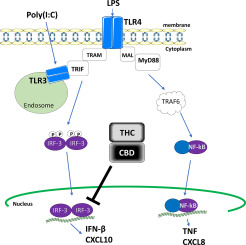当前位置:
X-MOL 学术
›
J. Neuroimmunol.
›
论文详情
Our official English website, www.x-mol.net, welcomes your
feedback! (Note: you will need to create a separate account there.)
MyD88-dependent and -independent signalling via TLR3 and TLR4 are differentially modulated by Δ9-tetrahydrocannabinol and cannabidiol in human macrophages
Journal of Neuroimmunology ( IF 2.9 ) Pub Date : 2020-06-01 , DOI: 10.1016/j.jneuroim.2020.577217 John-Mark Fitzpatrick 1 , Eleanor Minogue 1 , Lucy Curham 1 , Harry Tyrrell 1 , Philip Gavigan 1 , William Hind 2 , Eric J Downer 1
Journal of Neuroimmunology ( IF 2.9 ) Pub Date : 2020-06-01 , DOI: 10.1016/j.jneuroim.2020.577217 John-Mark Fitzpatrick 1 , Eleanor Minogue 1 , Lucy Curham 1 , Harry Tyrrell 1 , Philip Gavigan 1 , William Hind 2 , Eric J Downer 1
Affiliation

|
Toll-like receptors (TLRs) are sensors of pathogen-associated molecules that trigger inflammatory signalling in innate immune cells including macrophages. All TLRs, with the exception of TLR3, promote intracellular signalling via recruitment of the myeloid differentiation factor 88 (MyD88) adaptor, while TLR3 signals via Toll-Interleukin-1 Receptor (TIR)-domain-containing adaptor-inducing interferon (IFN)-β (TRIF) adaptor to induce MyD88-independent signalling. Furthermore, TLR4 can activate both MyD88-dependent and -independent signalling (via TRIF). The study aim was to decipher the impact of the highly purified plant-derived (phyto) cannabinoids Δ9-tetrahydrocannabinol (THC) and cannabidiol (CBD), when delivered in isolation and in combination (1:1), on MyD88-dependent and -independent signalling in macrophages. We employed the use of the viral dsRNA mimetic poly(I:C) and endotoxin lipopolysaccharide (LPS), to induce viral TLR3 and bacterial TLR4 signalling in human Tamm-Horsfall protein-1 (THP-1)-derived macrophages, respectively. TLR3/TLR4 stimulation promoted the activation of interferon (IFN) regulatory factor 3 (IRF3) and TLR4 promoted the activation of nuclear factor (NF)-κB signalling, with downstream production of the type I IFN-β, the chemokines CXCL10 and CXCL8, and cytokine TNF-α. THC and CBD (both at 10 μM) attenuated TLR3/4-induced IRF3 activation and induction of CXCL10/IFN-β, while both phytocannabinoids failed to impact TLR4-induced IκB-α degradation and TNF-α/CXCL8 expression. The role of CB1, CB2 and PPARγ receptors in mediating the effect of THC and CBD on MyD88-independent signalling was investigated. TLRs are attractive therapeutic targets given their role in inflammation and initiation of adaptive immunity, and data herein indicate that both CBD and THC preferentially modulate TLR3 and TLR4 signalling via MyD88-independent mechanisms in macrophages. This offers mechanistic insight into the role of phytocannabinoids in modulating cellular inflammation.
中文翻译:

通过 TLR3 和 TLR4 的 MyD88 依赖性和非依赖性信号传导在人巨噬细胞中受到 Δ9-四氢大麻酚和大麻二酚的差异调节
Toll 样受体 (TLR) 是病原体相关分子的传感器,可在包括巨噬细胞在内的先天免疫细胞中触发炎症信号。除 TLR3 外,所有 TLR 均通过募集骨髓分化因子 88 (MyD88) 接头促进细胞内信号传导,而 TLR3 则通过 Toll-Interleukin-1 受体 (TIR) 结构域包含接头诱导干扰素 (IFN) 发出信号β (TRIF) 接头诱导与 MyD88 无关的信号传导。此外,TLR4 可以激活依赖 MyD88 和独立的信号(通过 TRIF)。该研究的目的是破译高度纯化的植物衍生(植物)大麻素 Δ9-四氢大麻酚 (THC) 和大麻二酚 (CBD) 在单独和组合 (1:1) 时对依赖 MyD88 和 -巨噬细胞中的独立信号。我们使用病毒 dsRNA 模拟聚 (I:C) 和内毒素脂多糖 (LPS),分别在人 Tamm-Horsfall 蛋白-1 (THP-1) 衍生的巨噬细胞中诱导病毒 TLR3 和细菌 TLR4 信号传导。TLR3/TLR4 刺激促进干扰素 (IFN) 调节因子 3 (IRF3) 的激活,TLR4 促进核因子 (NF)-κB 信号的激活,下游产生 I 型 IFN-β,趋化因子 CXCL10 和 CXCL8,和细胞因子 TNF-α。THC 和 CBD(均为 10 μM)减弱了 TLR3/4 诱导的 IRF3 激活和 CXCL10/IFN-β 的诱导,而两种植物大麻素均未能影响 TLR4 诱导的 IκB-α 降解和 TNF-α/CXCL8 表达。研究了 CB1、CB2 和 PPARγ 受体在介导 THC 和 CBD 对 MyD88 独立信号传导的影响中的作用。鉴于 TLR 在炎症和适应性免疫启动中的作用,TLR 是有吸引力的治疗靶点,本文数据表明 CBD 和 THC 优先通过巨噬细胞中的 MyD88 独立机制调节 TLR3 和 TLR4 信号传导。这提供了对植物大麻素在调节细胞炎症中的作用的机制洞察。
更新日期:2020-06-01
中文翻译:

通过 TLR3 和 TLR4 的 MyD88 依赖性和非依赖性信号传导在人巨噬细胞中受到 Δ9-四氢大麻酚和大麻二酚的差异调节
Toll 样受体 (TLR) 是病原体相关分子的传感器,可在包括巨噬细胞在内的先天免疫细胞中触发炎症信号。除 TLR3 外,所有 TLR 均通过募集骨髓分化因子 88 (MyD88) 接头促进细胞内信号传导,而 TLR3 则通过 Toll-Interleukin-1 受体 (TIR) 结构域包含接头诱导干扰素 (IFN) 发出信号β (TRIF) 接头诱导与 MyD88 无关的信号传导。此外,TLR4 可以激活依赖 MyD88 和独立的信号(通过 TRIF)。该研究的目的是破译高度纯化的植物衍生(植物)大麻素 Δ9-四氢大麻酚 (THC) 和大麻二酚 (CBD) 在单独和组合 (1:1) 时对依赖 MyD88 和 -巨噬细胞中的独立信号。我们使用病毒 dsRNA 模拟聚 (I:C) 和内毒素脂多糖 (LPS),分别在人 Tamm-Horsfall 蛋白-1 (THP-1) 衍生的巨噬细胞中诱导病毒 TLR3 和细菌 TLR4 信号传导。TLR3/TLR4 刺激促进干扰素 (IFN) 调节因子 3 (IRF3) 的激活,TLR4 促进核因子 (NF)-κB 信号的激活,下游产生 I 型 IFN-β,趋化因子 CXCL10 和 CXCL8,和细胞因子 TNF-α。THC 和 CBD(均为 10 μM)减弱了 TLR3/4 诱导的 IRF3 激活和 CXCL10/IFN-β 的诱导,而两种植物大麻素均未能影响 TLR4 诱导的 IκB-α 降解和 TNF-α/CXCL8 表达。研究了 CB1、CB2 和 PPARγ 受体在介导 THC 和 CBD 对 MyD88 独立信号传导的影响中的作用。鉴于 TLR 在炎症和适应性免疫启动中的作用,TLR 是有吸引力的治疗靶点,本文数据表明 CBD 和 THC 优先通过巨噬细胞中的 MyD88 独立机制调节 TLR3 和 TLR4 信号传导。这提供了对植物大麻素在调节细胞炎症中的作用的机制洞察。











































 京公网安备 11010802027423号
京公网安备 11010802027423号